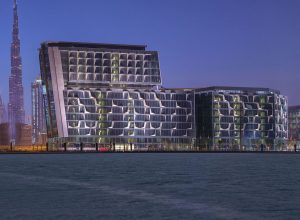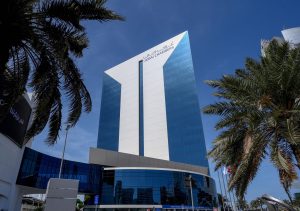
Former managing director at Accenture Strategy Middle East & Turkey for the past nine years, Raffaella Campagnoli is now the founder and managing director of LIRA Strategy Partners, a company that specialises in accelerating ecosystems.
With over 20 years of strategy consulting experience in international firms, Campagnoli reveals insights on how hospitality can face challenges, the most recent being the COVID-19 global pandemic.
Tell us a bit more about LIRA Strategy Partners, and its role in accelerating ecosystems.
LIRA Strategy Partners is a new strategic advisory boutique specialised in accelerating ecosystems, as you correctly said. Our mission is to support companies in building their competitive advantage by orchestrating specific capabilities provided by a network of expert partners.
In our view, this is fundamental for sustainability in the long term for every business: continuously innovating, rapidly scaling, operating with agility and variabilizing costs.
Your role revolves around transformation, a much-needed aspect in the wake of the global pandemic and what is yet to follow; how do you think hotels will transform throughout and after the crisis?
The hospitality industry has faced unprecedented disruption over the last two decades: now, the spread of coronavirus around the world has brought the worldwide tourism industry to a sudden freeze.
For the tourism industry, COVID-19 is turning out to be a bigger crisis than the SARS outbreak, 9/11 and the 2008 financial crisis. According to STR, Average Daily Rate (ADR) in the US takes time to recover; ADR recovery took 36 months and close to six years to recover post-9/11 and -2008.
Hotel operators must master competitive agility to bring back profitability and focus on producing the significant value which had been lost. Transformation, in this case, means boosting growth, championing optimising costs and refreshing the operating model by streamlining work processes. Of course, all of this is implemented by protecting the health and safety of employees, consumers and business partners.
How can operators gain competitive agility and what would you say should come first?
The challenge for hospitality now is to return to profitability as quickly as possible in a sustainable way for the future. We don’t know how long this pandemic will last and, moreover, we need to be prepared to face something similar in the future. Here are three programmes I would suggest for hoteliers to start to gain competitive agility:
Re-design the journey, digitalised: This means capitalising on existing technologies for making the hospitality and travel experience, not only friction-less, but also – potentially – touch-less.
In the event of another pandemic or similar challenge, hotel operators need to ensure employees, guests and partners a safe, protected environment. This goal can be reached by re-designing the full journey, enabled by technology.
Tools such as, for example, IoT, facial recognition, digital keys, wireless menus, robot-driven services, virtual reality and chatbots can still deliver personalised experiences, but also limit human interaction through an almost fully sterile journey.
This may not be what hospitality would probably call an ‘unforgettable experience,’ but at least hotels could become more agile and limit fixed-costs factors.
Find fuel for change: Owners and operators should put in place a set of actions to find the money to fund growth and change. The answer, both for the short and long term, is optimising existing people and non-people costs.
Looking at labour productivity is certainly something that major hospitality players are already engaged in, but deep diving into SG&A expenditures is definitely key to facing tomorrow’s challenges.
Operating with a Zero-Based Budgeting (ZBB) mentality, like many other industries have done over the last 10 years, would bring not only a clear picture on who is spending how much on what, but also a significant amount of money to re-invest for growth.
For example, introducing clear cost accountability models, increasing back-office effectiveness with shared services and optimising recurring costs (such as waste management, sponsorship, partnerships and travel) could generate up to 20-30% savings on the cost baseline.
Enhance the operating model: In order to gain competitive agility by infusing innovation and optimising costs, hospitality players will have to set up their ecosystems to capitalise on its power and potential. The idea is very simple: keep the core and strategic capabilities inside and get non-core capabilities from specialised and partners.
In the extreme, this is the same model Airbnb or Uber have been using to shape their business model: asset-free, leveraging on a network of partners delivering the best service, and controlling and monitoring tools orchestrating service levels.
More innovative industries such as retail (think about Amazon) or fashion (for example, Kering) are driving towards this model. Hospitality should move towards that direction too: what’s the value of delivering training internally if we can partner with specialised operators? Why not to leverage on a digital marketing-specialised agency rather than sustaining the cost of an internal team for doing that? Why not to engage with outsourcers for integrating data and working on analytics?
What’s the value of sustaining the cost of http://www.businesstoday.me/wp-content/uploads/2022/12/sample10.jpgistration and payroll, now commoditised on the market? We live in an era of specialisation, where every single piece of the value chain must be the best possible, executed for bringing organisations to success.
‘Digital’ is now the keyword for many industries; while hotels can utilise technology, it’s still an industry that relies heavily on offline factors. How can properties make the most of digitisation?
I think this is a very important point: hotel owners and operators are still very much driven by traditional business models. The key point is here is that technology isn’t necessarily a substitute to human interaction or personalised services: technology is an enabler and facilitator across the entire hospitality value chain.
Let’s look at guest experience, for example: nowadays, knowing the customer and anticipating their needs is key for any customer-driven organisation and this is why consumer goods companies and retailers have been investing in big data analytics and artificial intelligence.
The power of digitalisation can enhance the way hospitality offers its services to guests, increase efficiency (marketing efforts, for example), and streamline the very expensive labour cost as digitisation would reduce friction points (for example, automating non-core processes such as baggage storage and delivery).
In your research, you have stated that the ‘industry has been lagging behind in innovation efforts,’ can you please tell us a bit more about this and what it can do to accelerate?
The big challenge is that hospitality players need to build capabilities to capture the full value that can be generated by these technologies. For example, according to Gartner, 85% of Artificial Intelligence projects are expected to fail since many companies don’t have the foundations or the capital to implement such technologies.
To gain competitive agility by infusing innovation and optimising costs, hospitality players will have to revamp their operating model, consider digital innovation as a key aspect for facing the future and set up their ecosystems to capitalise on its power and potential.
By collaborating with specialised players from other industries, startups, and even competitors, hospitality can design, build, and execute the needed capabilities to lead in the ‘new’, gain momentum in the market and accelerate return on investment.
When it comes to collaborating with other industry players, how can hospitality go about doing that? What importance would you place on supplier/F&B relationships and partnerships?
As I mentioned, the future competitive strategy for such a traditional industry is revamping the operating model and capitalising on continuous innovation (products, services, customers and partners) to define the real entry barriers for the ‘new’.
Engaging with trusted partners and orchestrating this joint effort is the way to make it happen: in one of my recent projects, for example, we designed the ‘room of the future’ for a local hotel chain. The chain wanted to share the investment with other players: as soon as we went into the market, the kind of response we got from cross-industry operators was surprising – from FF&E manufacturers and digital advertising companies, to waste management software developers, virtual reality leaders, and payment systems operators…we found that a significant number of companies were keen on co-investing.
Of course, this is to be considered as the first step towards innovation – once piloted, then the partnerships need consolidation.
What’s the key piece of advice you can give hotels now and how do you see the future?
Making the new to happen isn’t complicated, but it requires a cultural change across the entire organisation. There are two main challenges that hospitality will have to overcome in the near future and revise their strategies accordingly:
Face the different innovation maturity levels across markets: Hospitality players might fail to provide a consistent experience across countries because of the gap in resources available and innovation maturity.
For this reason, there’ss no doubt that innovation strategy is to be centralised and the execution is to be “localised.” Yet, partner companies (orchestrators) can redefine localisation by connecting hospitality players with local partners, sponsors and suppliers in the ecosystem, who are the most suitable in driving the innovation strategy.
Fix the contention between fixing legacy systems and innovating: Due to inorganic growth operations in the hospitality industry, it often happens that players’ IT systems are fragmented and different. This has pushed hospitality players to fix the legacy systems in place.
Yet, the longer players take to innovate, the less relevant they will be for guests. Fixing the legacy system and innovating are not mutually exclusive – both can happen concurrently – while partner companies (orchestrators) can support players to innovate through the ecosystem.











